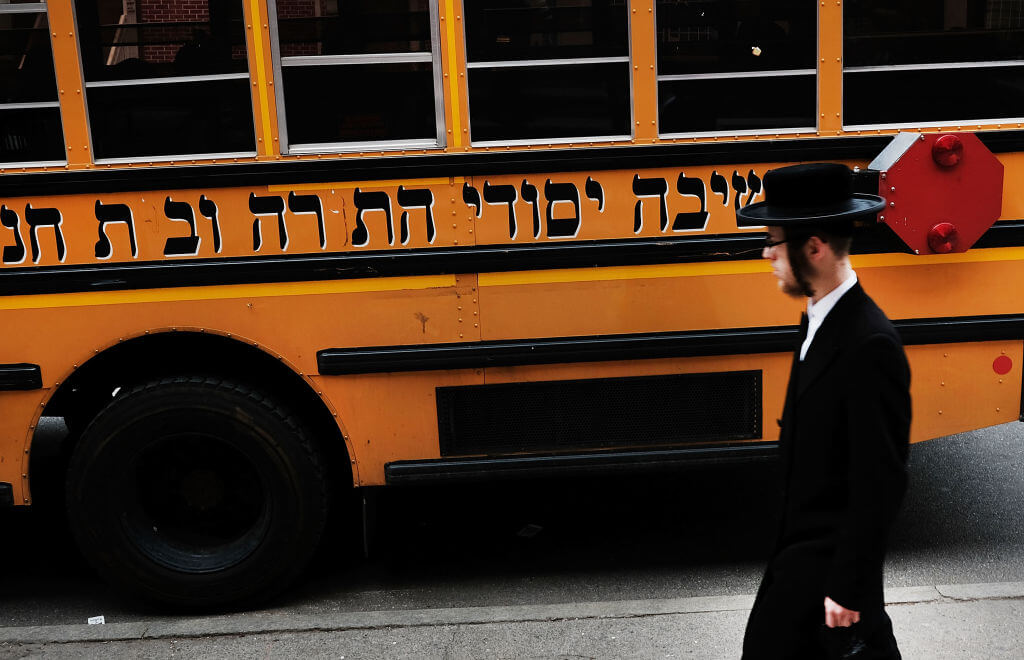New York Hasidic community denounces upcoming New York Times report on yeshivas
Ahead of Regents vote on state oversight of private schools, summary of report sparks ire in Orthodox circles

Leaders of New York’s Hasidic community are denouncing an upcoming New York Times investigation into the state’s religious Jewish schools, which they say used cherry-picked data and selected interviews to present a skewed version of reality. Photo by Spencer Platt/Getty Images
The New York Times plans to soon publish a monthslong investigation of Hasidic yeshivas documenting widespread failures in secular subjects; poor training of English teachers and few hours devoted to nonreligious subjects; and the “use of severe corporal punishment, which creates an environment of fear that makes learning difficult,” according to a summary of its findings obtained by the Forward.
Though the investigation has not yet been released, Hasidic leaders have already begun to denounce it based on the summary, which the Times’ reporters sent to the institutions that were the subject of its study, seeking comment. The article comes as New York’s Board of Regents prepares to vote later this month on an initiative that would allow the state to reject a yeshiva’s secular curriculum, after heated, yearslong debate over how much government oversight should be allowed in private schools.
Many Hasidic leaders see the proposed change as an attack on religious freedom, and some have already denounced The Times’ investigation. State Rep. Simcha Eichenstein, who represents the Orthodox Brooklyn enclave of Borough Park, penned a scathing op-ed in The New York Sun on Wednesday saying the report is based on “cherry-picked numbers.”
The Times “concedes that the majority of those to whom they spoke are not members of — or have left — the Hasidic community. Wonder why?” Eichenstein wrote. “Look in the mirror, Gray Lady. When you have a track record of demonizing Orthodox Jews, why would any sensible Hasidic or Orthodox Jew want to speak to you?”
A spokesperson for The Times did not respond to requests for comment before publication.
In the email summary obtained by the Forward, the reporters, Brian Rosenthal and Eliza Shapiro, say they interviewed 275 people, including 175 current or former students and parents and 50 current or former school employees, “dozens” of whom are “still in the Hasidic community.” They said their reporting also included budget documents and state test scores, and focused on a network of 150 boys’ schools in Brooklyn and the lower Hudson Valley that serve about 50,000 students.
Among their key findings, according to the email summary:
- Most boys’ schools teach English and math four days a week, “often for 90 minutes at a time after hours of grueling religious lessons,” and only for students ages 8 to 12.
- Instructors for these subjects are “often woefully unqualified,” hired off Craigslist or ads placed on lampposts and paid $15 an hour. Some are not fluent in English themselves, and some schools ban students from speaking English at home and censor textbooks.
- 99% of the students in grades 3 to 8 in boys’ schools who took state standardized tests in the most recent year available failed; the Hasidic yeshivas had the worst results of any schools in the state. About 80% of the girls in Hasidic schools failed these tests.
- While private, the schools have received about $1 billion in public funds over the past five years, including $100 million specifically for secular education.
The article will also talk about the Hasidic community’s political power, which was studied via voting records, and how the schools play a central role — including by sending home sample ballots and awarding students who brought “I Voted” stickers to school with a trip to Coney Island, while children who did not bring the stickers had to stay back at school.
The reporters said in their memo they will attribute poverty rates in the Hasidic community at least partly to this lack in secular education. As for corporal punishment, the reporters say in the summary that they have “heard dozens of stories of teachers in the last 10 years hitting kids with belts, sticks and rulers,” and that some Hasidic schools have asked teachers in the last few years “to be less violent, but corporal punishment has remained common.”
“Sometimes,” they added, “it is so severe that boys call 911.”
Rosenthal and Shapiro sent the email to an unknown number of Hasidic leaders and institutions, including in each one an addendum with specific findings relating to the individual institution. They wrote that the email was intended to provide recipients “an overview as well as a last opportunity to comment,” and set a deadline for noon on Sept. 7 for “on-the-record additional information, comments or statements.”
They said they expected to publish the investigation this weekend and would let the email recipients know “if anything substantive changes” before publication.
















